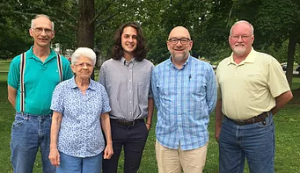
The inventory covered six sectors of community-wide activities that contribute to carbon emissions, namely, the residential and commercial use of natural gas, electricity and potable water, as well as the energy needed to treat wastewater and handle solid waste for the community. The final sector included partial data to track emissions from vehicle travel originating in Oldenburg and travel miles of persons who drive to Oldenburg for work.
The report found that Oldenburg has the CO2e total registered 9,517 metric tons or 14.1 metric tons per person for the 2017 year. To read the complete report and view the slides from this report, visit OREC’s page on the town’s website by clicking here.
This report included a list of recommendations for residents, businesses and institutions to choose ways to increase energy efficiency and decrease their carbon footprint. There are seven immediate actions community members can take such as planting more native trees and taking advantage of a FREE in-home energy assessment valued at $180 provided by Duke Energy, Oldenburg’s electricity provider, or changing incandescent light bulbs to LED bulbs. Increasing recycling efforts, and cutting back on single-use plastics will go far in keeping CO2 out of the atmosphere. OREC learned that the recycled material collected in the town by Rumpke prevented the release of 60 metric tons of greenhouse gas emissions. Other “first steps” to a fossil-free future are available on OREC’s webpage.
There are six other recommendations that will take more time to learn about and put into place to reach the goal suggested in this report. These include installing solar panels or joining community-solar programs, switching to electric vehicles (EV) within the coming decade, and getting charging stations installed in town to support the EV transition. OREC will also support a new town goal to realize a trail system between Oldenburg and Batesville that could increase foot and bicycle traffic to cut back on vehicle use for short trips between the towns.
OREC members will be offering free workshops and other educational programs in the next two years to facilitate the town’s move into the renewable energy future. OREC members dream that this small town, widely known as the “Village of Spires,” will soon be called the “Village of Renewable Energy.” They hope to inspire not only Oldenburg residents but also visitors and tourists to work together to decrease their carbon footprint.



